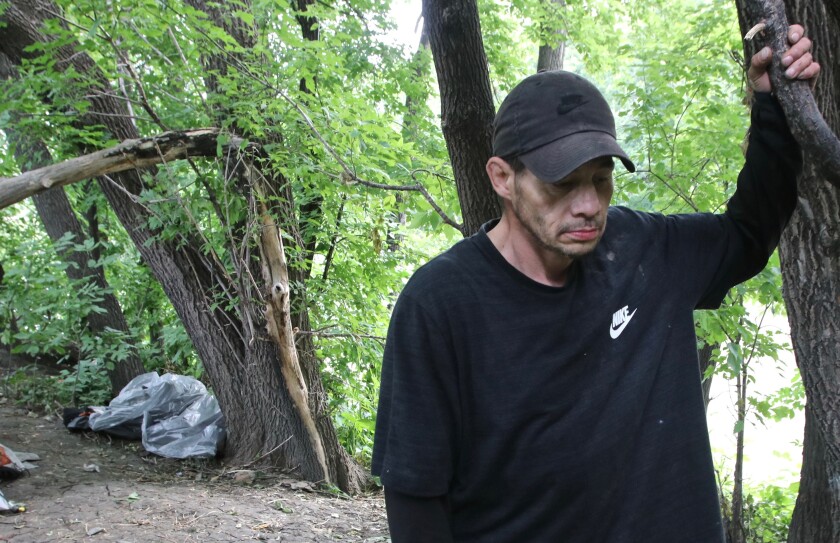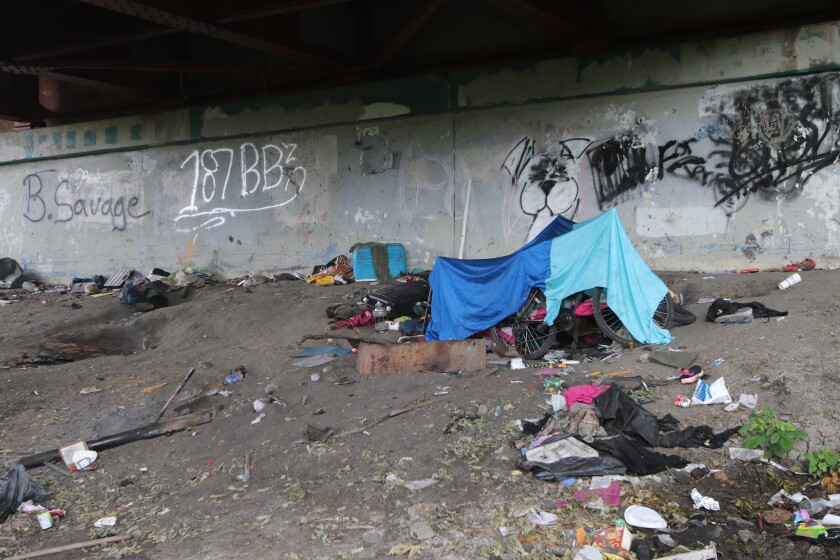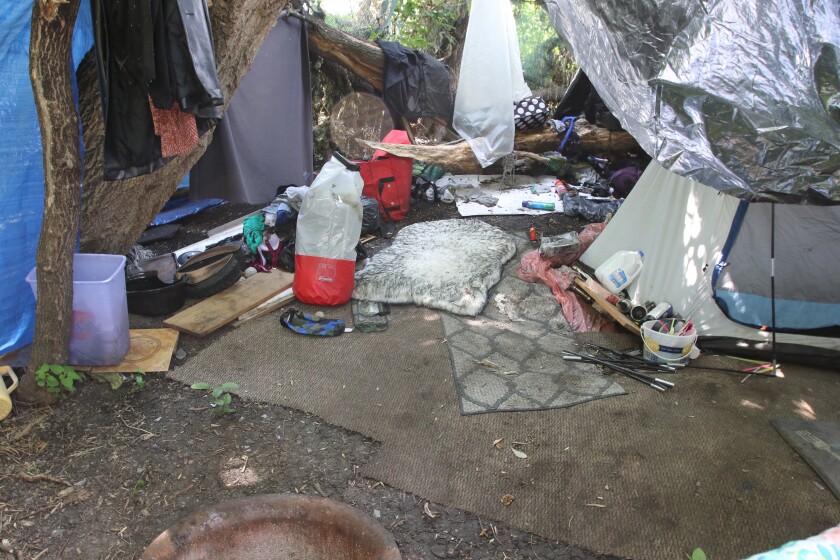FARGO — Linda Miller pried back branches cut down to camouflage her camp along the Red River in Fargo. She’s careful. She’s worried that at any time police could come and kick them out. Her group of three has already been warned to move, but they have no other place they want to go.
“I haven’t run into cops yet, but it’s hard to find a camping area, and people are also coming and stealing all the time,” said Miller, a Native American woman from the White Earth Nation. She said she's been homeless since she was released from prison about a year ago.
ADVERTISEMENT
Inside the camp, about the size of a mobile home trailer, saplings and undergrowth have been cleared. Yawning oaks protect them from some wind and rain. A soupy wall of younger trees hides them from passersby. As long as they keep quiet, don’t attract attention with too many campfires, and tidy up garbage, Miller hopes they can just be left alone.
“I love nature, and we’re homeless," Miller said. "Some of us do have addictions, but we have been sober out here."
Her friend Chad Charboneau, part Ojibwe and Dakota from the Turtle Mountain Band of Chippewa, stayed up all night in mid-July so Miller and her uncle could sleep.
“You never know who is passing by," Charboneau said. "I went to prison and got out, and I just like staying out here. I prefer it. I have a place to go, but I prefer it out here. It’s the Native in me."

Living along the Red River, not unlike his ancestors may have done a century or more ago, Charboneau feels closer to his roots.
“We go into the trees and we see the spirits," he said. "Being out here brings me closer to them."
During the day, Miller carves miniature bows and arrows. She doesn’t know how to hunt, but sometimes Charboneau will go fishing. When they get hungry, they usually head to the Salvation Army, and they go to the Downtown Engagement Center for a shower.
ADVERTISEMENT
“Sometimes we go hungry. We don’t have the money to eat or wash clothes,” Charboneau said, noting the homeless population along the river can sometimes exceed 100 people.
Miller said the group doesn't cause any harm and picks up after themselves.
Law enforcement, however, has been hard on the group, she said. A few weeks ago, they received a $100 citation for possessing alcohol, something Miller disputes.
"There’s no way I can pay that, and I was only drinking water in a pop bottle," she said. "They just assume we’re drinking."
Authorities told her and those living in the camp to leave, "but we're still here," Miller said.
“Down here, it’s against the law, they (police) said," Charboneau added. "If they know we’re here, they’ll come. If they do come, we’ll have to go. I don’t want to go back to jail. But we’ll just come back later."

ADVERTISEMENT
Legalities of living by the river
On both sides of the Red, camping along the river is illegal. Land surrounding the Red River in the Fargo area is a mixture of properties owned by the Fargo Park District, the City of Fargo, and private landowners.
Tori Benders, communications and marketing specialist with the park district, said nobody is allowed to camp overnight in land owned by the park district except in designated areas, which require a reservation and a fee.
Gregg Schildberger, city spokesperson, said agencies involved in trying to help those who are homeless along the Red River are in discussions to identify a “unified and clearly-communicated path forward.”
Describing the issues as important and evolving, Schildberger did not address specific questions The Forum asked, adding that answers will follow the completion of upcoming city meetings.
“I want to be very clear, however: there is no attempt to criminalize homelessness in our metro,” he said.
Private landowners will typically call police if they see people trespassing on their properties. In 2021, regarding homeless camps along the river and related safety issues because groups were larger than before.
In Moorhead, city statute stipulates that no garages, tents, accessory buildings or mobile homes can be used without proper authorization.
ADVERTISEMENT
The Moorhead Police Department, however, is not involved in cleaning up the riverfront like Fargo police are, according to Moorhead Police Captain Deric Swenson.
“The Moorhead Police Department isn’t directly involved in it, and (that) has to do with a Minnesota statute that requires us to hold all unclaimed property for a period of time," Swenson said. "If we get called, we have to place a bunch of stuff in evidence and hold it, and we don’t have the room."
The same homeless advocates — the Downtown Engagement Center, the Harm Reduction Division of Fargo Cass Public Health, and others — work on both sides of the river, however, and Moorhead police respond if needed.
In Fargo, police and employees with the park district routinely go out to clean up the camps, but they follow homeless advocates who try to assess situations in hopes of finding permanent shelter for the homeless people there, Benders said.
“Homeless outreach workers make contact first, and from there, the Fargo Police Department will move in,” she added.

Stuck under a bridge
A 37-year-old man who said his name was Nashina Howe has been living along the Red River for the better part of three years. In the winter, he digs a hole 3 feet deep and snuggles in with tarps and blankets over the top during the coldest nights.
ADVERTISEMENT
“And lots of fires,” Howe said about surviving winter along the Red River. “It’s harsh. It gets so bad down here. Sometimes I get covered by snow, and the snowdrifts get so high I’m stuck. I didn’t choose this life, but nobody likes a bad background.”
Howe said he applied to area apartments but was denied each time. People from the Downtown Engagement Center have tried to help, but he’s still stuck under a bridge.
Surrounding him are his treasures: a bicycle, backpacks, blankets and jewelry, finds that he dug out from dumpsters, he said.
“I find what I can find and sell it. All that I have here has all been found,” Howe said.

Around his neck, he wears a necklace with what he believes to be a diamond, his most prized possession. He stays under a particular bridge to protect nearby rocks, which he believes are dinosaur bones, and also for the shrews, mole-like mammals that keep him company.
A faux-fur strip is attached to a belt loop, like a tail.
“It’s just something that is different and strikes up a conversation,” Howe said.
ADVERTISEMENT
Last year, he lost all his belongings when police came through the area to clean it up, he said.
“They’re better this year than last year, though," Howe said. "They got rid of my stuff at least five times last year."
‘I’m a light sleeper’
On July 11, Miller woke up with a head cold from the chilly night along the Red River. She said she no longer has any ID or other documentation because police took them away last year. No papers means no job, no house, she said.
“It’s hard because I have a criminal record,” said Miller, which includes some assault cases, conspiracy to commit robbery in 2014, and being a fugitive from justice.
Now, her record is clean, except for a citation for possessing alcohol on June 26, a $100 ticket.

“They take our belongings, but they should give us some time. I lost a lot of stuff about a month ago. It’s all probably in a dump somewhere,” Miller said.
Both Miller and Charboneau know they’re not safe in the trees along the Red River. Incidents have occurred there, like the in October 2022.
“I’m a light sleeper, and if somebody walks up and snaps sticks, then I’ll hear it," Miller said. "We know people all along the river, and we check on each other, but it would be a problem to have something like a tent city down here."
“We try to take care of each other down here,” Charboneau said.








